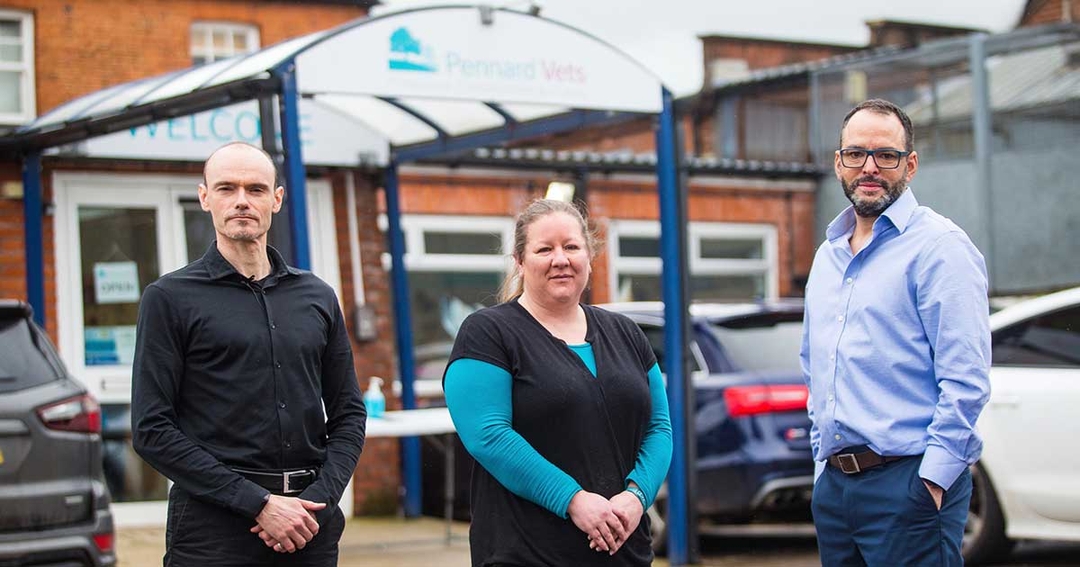5 Mar 2021
Employees of 125-year-old Pennard Vets in Kent become shareholders in the business and take a share of profits – plus the practice stays independent.

From left: Andy Green, Caroline Collins and Matt Flann.
Pennard Vets in Kent has become one of only a handful of practices in the UK to be transferred into employee ownership.
The deal creates an employee ownership trust (EOT) meaning Pennard’s 90 employees across six sites are now shareholders in the business and take a share of profits.
It also means the 125-year-old practice stays independent – a key priority for the existing partners who turned down lucrative offers from corporate consolidators before pressing ahead with their plans to transfer ownership.
Pennard’s three existing directors – Matt Flann, Caroline Collins and Andy Green – will continue to work for the practice, which turns over around £5 million a year. The only difference is that, as of 2 March, the trustees have a full say on its future.
And for Mr Flann that means Pennard Vets is in safe hands. He said: “We have had some lovely offers from corporates to sell, and we had to make that decision and be true to our values.
“For us we just didn’t want to go down that corporate route, and the traditional James Herriot partner progression model is not really working anymore, is it?
“So we were looking for a good succession plan as we felt we had to. The practice is 125 years old now and I have worked here since 1999, and we all know what it is like to be working in the teams and working side by side with these people, so we just wanted to do what was right for those teams – they deserve it.
“We have faith in the business; we have faith in the team, so we are confident we will get that money back over time in this way.”
The John Lewis-style arrangement will also mean the culture at Pennard Vets will be protected – an issue that was also high on the agenda when the partners were assessing their options.
Mr Flann added: “We are caretakers, and that is the way we have seen it since we became partners ourselves and took on the leadership roles in the teams.
“We are looking after this wonderful place that is 125 years old; that is the way we have always thought about it and this is a natural progression of that as we wanted to preserve the heritage for another 125 years.
“One thing we were also desperately keen to do is protect the culture. We have a lovely culture and we want to try to keep that. We have around 20 vets and 30 nurses, and the whole team, receptionists and practice administrators will benefit.”
Members of the EOT will not pay any of their own money into business and all shares are held on their behalf by the trust.
When the business has built up enough capital, a dividend payment will be triggered to the trust, which will then divide that payment among its members.
In this way the EOT gives all staff a stake in the business and while it is not the driving force for the venture, Mr Flann believes it could also deliver a dividend when it comes to recruitment and retention, too.
He said: “The data shows this type of transfer improves engagement and productivity; there is a lot of data on that.
“It will also help with retention and attracting people to the practice as well. Recruitment is not easy for anyone and while we do okay in that respect because the practice has a good name, hopefully after this there will be even more people to choose from.
“But, again, that is not the reason we did it – we did it because we wanted to do the right thing and we did it because we want to be fair.”
Commenting on the news, SPVS board member Vicki Farbon said: “A large percentage of our members at SPVS are from independent practices and it is great to hear news like this.
“It is certainly a different and innovative approach in a market where it is increasingly difficult for vets to buy into independent practices.
“The unique nature of this concept is a breath of fresh air in the veterinary field and will certainly give the business something that very few other employers could ever compete with.”